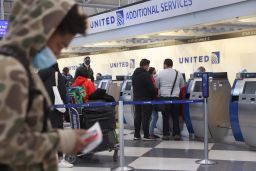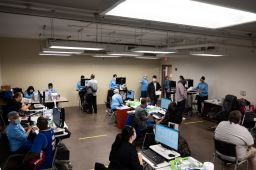States are pushing ahead with expanding Covid-19 vaccine access and rolling back restrictions on businesses and large gatherings as America seeks a return to normalcy.
But experts say two barriers stand in the way of reaching herd immunity and getting back to life as we knew it – Covid-19 variants and vaccine hesitancy.
“We’re seeing restrictions being lifted in so many parts of the country, we’re seeing travel at an all-time high. People are already going back to pre-pandemic normal,” emergency physician Dr. Leana Wen told CNN’s Anderson Cooper on Thursday.
“We have a pretty narrow window of opportunity to make clear what the benefits of vaccinations are. We know that these vaccines are really effective at preventing severe disease. They also do substantially reduce your risk in each of these different types of settings, whether it’s going to the restaurant or gym, or seeing family and friends.”

More than 23% of the US population – over 77.2 million people – have received at least one dose of vaccine, according to the Centers for Disease Control and Prevention. Among Americans 65 and older, more than 67% of the population have received at least one dose.
More than 118 million doses of Covid-19 vaccine have been administered in the US, according to CDC data, and 100 million of those have been reported during President Joe Biden’s time in office.
On Friday, Biden doubled his previous target, announcing a goal to have 200 million doses administered by his 100th day in office.
Despite the progress, as of Thursday at least 10 states have seen reported increases of 10% or more in their daily average coronavirus cases when compared to last week, according to Johns Hopkins University data.
The uptick comes as more states are reporting the spread of variants that are more infectious and may defeat prior immunity for those who had Covid-19.
New variant more deadly and contagious, Fauci says
The B.1.1.7 variant, first discovered in the United Kingdom, is projected to become the dominant variant by the end of March or early April, according to the CDC. Research from earlier in the year suggests that vaccination can still provide protection against new variants.
The spread of that variant means vaccination is more important than ever, as are measures such as mask use and social distancing, Dr. Anthony Fauci said during a White House briefing, as the variant is both more contagious and likely more deadly.
The B.1.1.7 variant, first detected in Colorado in December, has since been identified in 50 US jurisdictions and “now likely accounts now for about 20 to 30% of the infections in this country. And that number is growing,” Fauci said.
The variant is about 50% more transmissable than the original virus, according to UK documentation, Fauci said.
“In a couple of UK studies, this one looking at over 54,000 matched pairs of participants in the UK in which one person was infected with the B.1.1.7 and another one with the previously circulating variant, there was a 64% increased risk of death for those with the B.1.1.7,” Fauci told the briefing. He showed a second study that indicated a 61% higher risk of death with B.1.1.7.
Vaccines, however, appear to protect well against B.1.1.7, and treatments such as monoclonal antibodies also appear to work against this particular variant, Fauci noted.
Because of the complications provided by variants, experts say mass inoculation is necessary. But according to Wen, the situation is more nuanced than believing American society is strictly divided between pro-vaccination and anti-vaccination proponents.
“We’re neglecting the huge number of people in the middle who need, who want to get the vaccine but may have some concerns or just don’t have time to take time off of work or find child care,” she said. “We need to make vaccination easy for those individuals and also really clearly demonstrate what is the benefit of vaccination, make clear the messaging that vaccines are the pathway back to pre-pandemic life.”
States juggle expanding vaccine access and ending capacity rules
With an increase in supply, more states have expanded eligibility for the vaccines.
In New Hampshire, residents 50 and older will become eligible on Monday, and the state plans to expand access to all its citizens 16 and older “in just a matter of weeks,” according to New Hampshire Gov. Chris Sununu.
When asked to comment on the state’s rising average of new daily cases of Covid-19, Sununu said, “it’s really about getting the hospitalizations and the fatality rate down, which is continually coming down.”
According to the governor, a lot of people are also getting lax about mask wearing and social distancing. “We are not out of this yet,” Sununu said.

Starting Monday, Louisiana will expand vaccine eligibility to a long list of essential workers, including individuals working in higher education, food service and grocery stores, manufacturing, transportation, clergy and others. On Tuesday, Maryland will expand access to everyone ages 60 and up.
Kentucky will allow access to vaccination for those ages 50 and older starting Monday and aims for all adults to be eligible April 12. The state also joins others that have begun to open up gathering restrictions by easing curfews for bars and restaurants beginning Friday, capping them at 60% capacity.
Massachusetts will allow 12% attendance at stadiums, arenas and ballparks next week. Public-setting capacity limits are increased to 100 people indoors and 150 outdoors, with indoor house gatherings remaining at 10 people allowed.
You asked, we answered: Your top questions about Covid-19 and vaccines
Border restrictions continue as domestic travel rises
Meanwhile, the US is extending travel restrictions on the land borders with Canada and Mexico through April 21, the Department of Homeland Security announced Thursday. The move will mark more than a year since the restrictions first were put in place.
Within the nation, air passenger travel is increasing. More than a million passengers traveled by air each day from March 11-17, the longest consecutive streak of million-per-day passengers this year, according to Transportation Security Administration data.
Dr. Wen stressed on Thursday to CNN that with the visible increase in travel and people moving toward pre-pandemic lifestyles without proper safety measures, a message needs to be enhanced by the CDC to the general public: inoculation leads to a quicker return to safer activities.
“What the CDC really needs to do at this point is to say for unvaccinated people, here are the activities that are low risk, medium risk and high risk. Probably a lot of things are going to be high risk for unvaccinated people,” Wen said.
“Then they need to say for vaccinated individuals, you’re able to do so much more. Nothing is going to be zero risk, but many of these activities that were formally high risk are now low risk,” she said. “I think that type of benefit of vaccination really needs to be illustrated to people.”
CDC relaxes distancing guidelines for schools
The CDC on Friday changed its guidance on physical distancing for children at school, recommending masked students maintain at least 3 feet distance from others, down from the previously recommended 6 feet.
Schools have to keep other precautions in place for this to work, CDC Director Dr. Rochelle Walensky said at a White House briefing.
“These include universal and correct use of masks, physical distancing, hand washing and respiratory etiquette, cleaning to maintain healthy facilities and diagnostic testing with rapid and efficient contact tracing in combination with isolation in quarantine and in collaboration with local health departments,” Walensky said.
The change in guidance may allow more schools to open or allow more students to be present in a school, experts said.
CNN’s Maggie Fox, Arman Azad, Naomi Thomas, Kelsie Smith, Gisela Crespo, Rebekah Riess, Chris Boyette, Juliana Battaglia, Kristina Sgueglia, Steve Almasy, Geneva Sands, Lauren Mascarenhas and Nick Neville contributed to this report.


















